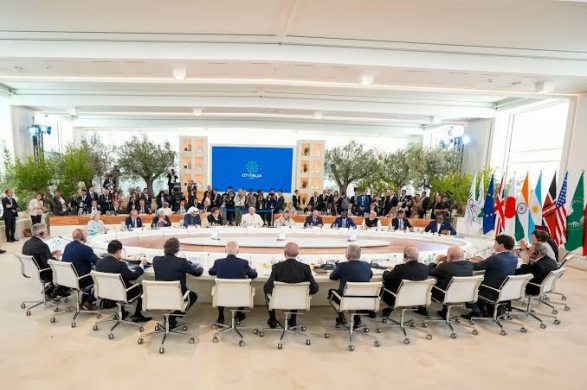
G7 Leaders Address Migration, AI, and Economic Security in Italy Summit
By Fiona Nanna, ForeMedia News
3 minutes read. Updated 3:00PM GMT Sat, June 15, 2024
The Group of Seven (G7) summit, held in Italy’s picturesque Puglia region, concluded with a focused agenda on migration, artificial intelligence (AI), economic security, and geopolitical concerns. Leaders emphasized the urgency of global cooperation amid mounting challenges.
Discussions encompassed critical issues like financial assistance for Ukraine, the conflict in Gaza, climate change, Iran, gender equality, and China’s economic policies. Notably, the absence of a reference to abortion in the final declaration sparked divisions among the leaders.
French President Emmanuel Macron highlighted the summit’s role in fostering convergence on pressing matters, including the conflicts in Ukraine and the Middle East. Migration took center stage, with leaders exploring strategies to combat trafficking and invest in the origins of migration, particularly affecting Africa.
Italian Prime Minister Giorgia Meloni’s proactive stance on migration resonated, emphasizing the need for investment in African nations to alleviate migratory pressures on Europe. The creation of the G7 Coalition to counter migrant smuggling underscores collective efforts to address the root causes of irregular migration.
British Prime Minister Rishi Sunak echoed Meloni’s sentiments, emphasizing the importance of curbing criminal influence on migration pathways. Noteworthy initiatives include Italy’s partnership with Albania and Britain’s deportation agreement with Rwanda, albeit facing criticism from human rights organizations.
President Joe Biden’s administration faced challenges in addressing migration, with new policies encountering legal obstacles. Beyond the G7, the summit’s inclusivity extended to African leaders, emphasizing Meloni’s initiatives and development partnerships.
However, criticisms arose regarding the perceived lack of ambition in supporting developing countries. The ONE Campaign highlighted declining aid to Africa, calling for tangible actions to fulfill promises of partnership.
In a historic move, Pope Francis addressed the summit on the implications of AI, underscoring broader ethical considerations. Additional participants, including Ukrainian President Volodymyr Zelenskyy and Brazilian President Luiz Inácio Lula da Silva, contributed to the summit’s multifaceted discussions.
While the summit demonstrated solidarity on key issues like supporting Ukraine, notable discrepancies emerged, notably regarding abortion rights. Macron lamented the omission of abortion references, reflecting broader debates on gender equality and reproductive rights.
Italian Prime Minister Meloni’s policies drew scrutiny, with concerns raised about potential setbacks to abortion rights in Italy. Despite assurances, opposition voices caution against compromising established rights.
The G7 summit in Italy showcased a blend of diplomatic efforts, regional concerns, and global aspirations. As leaders depart, the challenge lies in translating rhetoric into tangible actions to address the world’s most pressing challenges.

